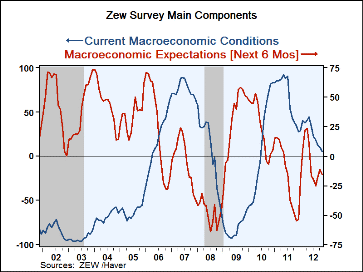 Global| Nov 13 2012
Global| Nov 13 2012German Zew Survey Weakens
Summary
German financial experts continue to see weakening conditions in Germany. The current index fell from 10 to 5.4 and expectations edged down to -15.7 from -11.5. At these levels the current index is stronger about 35% of the time [...]
German financial experts continue to see weakening conditions in Germany. The current index fell from 10 to 5.4 and expectations edged down to -15.7 from -11.5. At these levels the current index is stronger about 35% of the time making current conditions better than normal but no longer ‘strong’ (except in comparison to the rest of Europe).
However, just one year ago the current reading for Germany was 34.1 and conditions were stronger than that only about 19% of the time. The current situation has slipped by quite a lot in one year. Indeed, times were so good one year ago that expectations were looking for things to cool. Expectations stood at -55.2 a level so low that expectations are stronger than that about 99% of the time! But as current conditions have eroded, expectations have gyrated and now stand at -15.7 they are weaker than this 85.4% of the time. It is no longer true that Germans expect things to get worse because they are so good they can hardly get better. With current conditions sagging and risk mounting in the Zone Germans are beginning to feel hemmed in as their own economy loses its vibrancy.
There may once have been a feeling that Germany could escape the troubles in the rest of the Zone; that belief is gone. Its erosion is seen in the rise of the ECB target2 balances at the ECB as well as the degradation in economic conditions across the zone itself. The obligations of zone membership are being felt across the Zone in rich as well in poor nations.
Only now, in early November, are the Troika assessments on Greece being made and even so it is not clear what is going to happen. Funds have not yet been released to Greece. The IMF wants to know that the debt to GDP ratio will be below 120% by 2020 and does not want to change the end date for that requirement that must be met before it advances any more funds. As Greece has slipped from its path it is in need of more money which means more lending which means more debt which blows its 2020 deadline out of the water. The only way to reduce the Greek debt levels to their previously agreed proportion to GDP by 2020 would be through more debt forgiveness. Germany is opposed to that and especially opposed to any more losses before elections in 2013. So the Euro-Zone is a tangle of opposing needs and conflicting requirements. And all of that is just over Greece, while other zone countries have some of their own severe issues that have yet to be dealt with.
Not only is Germany’s economy losing steam because of weaker global demand and less demand for its export oriented economy’s output, but German is being assailed by great needs on the part of other fellow Eurozone members. The slow slide in German confidence and conditions seems to be in place and will likely continue for some time. There are no signs of a turnaround as the problems in the Zone show little sign of repair and the global economy continues to be challenged. .
| ZEW Economic Index For Germany | |||||||
|---|---|---|---|---|---|---|---|
| Level of Zew Index | Averages | ||||||
| Nov-12 | Oct-12 | Sep-12 | YrAgo | 3-mo | 6-Mo | 12-Mo | |
| Current | 5.4 | 10 | 12.6 | 34.2 | 9.3 | 16.8 | 26.5 |
| Expectations | -15.7 | -11.5 | -18.2 | -55.2 | -15.1 | -17.9 | -10.1 |
| Percentiles | |||||||
| Current | 54.7 | 57.1 | 58.5 | 69.8 | |||
| Expectations | 31.4 | 34.1 | 29.8 | 5.7 | |||
| Percentiles are readings in this period as percentile of the full range of values back to 1/92 |
|||||||
| Count Percentiles: reading is stronger than this 'XXX' percent of the time... | |||||||
| Current | 34.8% | 31.5% | 30.3% | 18.6% | |||
| Expectations | 85.4% | 84.9% | 87.4% | 98.6% | |||
Robert Brusca
AuthorMore in Author Profile »Robert A. Brusca is Chief Economist of Fact and Opinion Economics, a consulting firm he founded in Manhattan. He has been an economist on Wall Street for over 25 years. He has visited central banking and large institutional clients in over 30 countries in his career as an economist. Mr. Brusca was a Divisional Research Chief at the Federal Reserve Bank of NY (Chief of the International Financial markets Division), a Fed Watcher at Irving Trust and Chief Economist at Nikko Securities International. He is widely quoted and appears in various media. Mr. Brusca holds an MA and Ph.D. in economics from Michigan State University and a BA in Economics from the University of Michigan. His research pursues his strong interests in non aligned policy economics as well as international economics. FAO Economics’ research targets investors to assist them in making better investment decisions in stocks, bonds and in a variety of international assets. The company does not manage money and has no conflicts in giving economic advice.
More Economy in Brief
 Global| Feb 05 2026
Global| Feb 05 2026Charts of the Week: Balanced Policy, Resilient Data and AI Narratives
by:Andrew Cates







